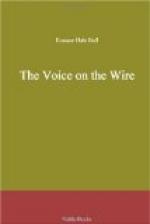“You are here, sir, as a friend of the family?”
“Yes. Howard has told me of the terrible mystery of this case. As an ex-newspaper man I imagine that my influence and friendships may keep the unpleasant details from the press.”
“That is good,” sighed the doctor, with relief. “How soon will you do it?”
“Now, using this telephone. No, for certain reasons, I had better use an outside instrument. I will call up men I know on each paper, as though this were a ‘scoop,’ so that knowing me, they will be confident that I tell them the truth as a favor. Such deceit is excusable under the circumstances. It may eventually bring the murderer to justice.”
Professor MacDonald winced at the word. He turned toward Van Cleft, on sudden thought, remarking: “Howard your mother and sister may need the comfort of your presence. I will chat with your friend until the Coroner comes.”
The physician sank into a library chair. The criminologist quietly awaited his cue. He lit a cigarette and the minutes drifted past with no word between them. The doctor’s gaze lowered to the vellum-bound books on the carven table, then to the gorgeous pattern of the Kermansha at his feet. Once more he studied the face of his companion, with the keen, soul-gripping scrutiny of the skilled physician. As last he arrived at a definite conclusion. He cleared his throat, and fumbled in his waistcoat pocket for a cigar. A swiftly struck match in Monty’s hand was held up so promptly to the end of the cigar, that the doctor’s lips had not closed about it. This deftness, simple in itself, did not escape the observation of the scientist. He smiled for the first time during their interview.
“Your reflex nerves are very wide awake for a quiet man. I believe I can depend upon those nerves, and your quietude. May I ask what occupation you follow, if any? Most of Howard’s friends follow butterflies.”
“I am one of them, then. Some opera, more theatricals, much art gallery touring. A little regular reading in my rooms, and there you are! My great grandfather was too poor a trader to succeed in pelts, so he invested a little money in rocky pastures around upper Manhattan: this has kept the clerks of the family bankers busy ever since. I am an optimistic vagabond, enjoying life in the observation of the rather ludicrous busyness of other folk. In short, Doctor, I am a corpulent Hamlet, essentially modern in my cultivation of a joy in life, debating the eternal question with myself, but lazily leaving it to others to solve. Therein I am true to my type.”
“Pardon my bluntness,” observed MacDonald, watching him through partially closed eyes. “You are not telling the truth. You are a busy man, with definite work, but that is no affair of mine. I recognize in you a different calibre from that of these rich young idlers in Howard’s class. I am going to take you into my confidence, for you understand the need for secrecy, and will surely help in every way—noblesse oblige. This man Cronin, the detective, was rather crude.”




